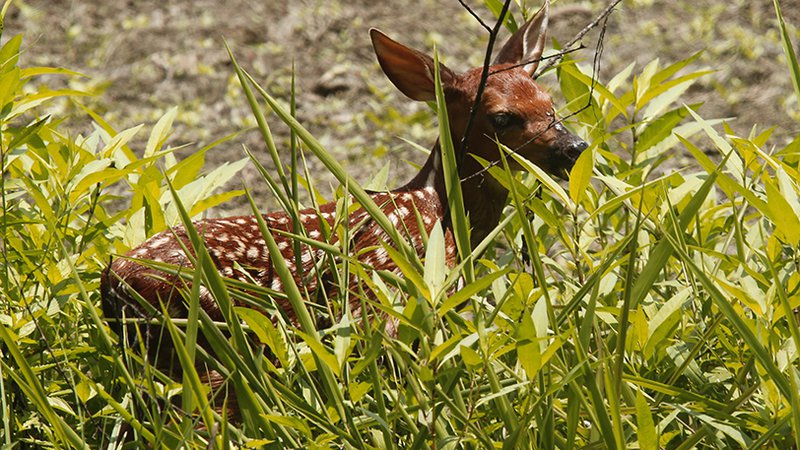Unattended fawns likely not abandoned
ON 05-02-2018

May 2, 2018
Randy Zellers
Assistant Chief of Communications
LITTLE ROCK – Each spring, thousands of Arkansas deer give birth to fawns. And each year, biologists with the Arkansas Game and Fish Commission get calls from worried, conservation-minded individuals who happen across one of these young deer sitting still in the tall grasses where it is hiding. But that abandoned fawn likely isn’t abandoned at all. In fact, its mother may be just out of sight, waiting for you to leave so she may tend to her young.
“It’s part of their survival mechanism,” said Ralph Meeker, deer program coordinator for the AGFC. “That fawn is trying to stay as still as possible so that it remains hidden. That is why fawns have spots. It is their camouflage. The mother needs to go out and feed in order to produce milk for the fawn to nurse. The longer the doe is directly with that fawn, the more attention she brings to it. This increases the fawn’s likelihood of being eaten by a predator.”
Many well-meaning people pick up these fawns and try to take care of them, but that’s not only bad for the animals, it’s illegal. As part of its prevention protocol against the continued spread of chronic wasting disease, no one is allowed to possess a fawn, including permitted wildlife rehabilitators.
Because of the extreme risk to the state’s deer herd, moving live deer is forbidden in the state without prior approval from the chief of wildlife management.
In addition to the risks of spreading disease, moving a fawn usually ends up being a bad situation for both the fawn and the well-meaning individuals.
“Deer are wild animals, not pets,” Meeker said. “Even if a person illegally kept a fawn and tried to raise it, it would never be domesticated like a dog or a cat. Some may appear docile, but many people have been injured by wildlife pets they thought were tame.”
If you feel that a fawn is in immediate danger by laying in or very near a road or in the path of haying equipment, pick it up and move it over a few feet. Never remove it from the immediate area. The mother will periodically check on her young.
“Deer mature rather quickly and are very adaptable,” Meeker said. “A fawn can begin to eat and digest native vegetation within two weeks after birth and are completely weaned within two to three months. That deer has a much better chance of surviving if you simply let it be.”
Recent News

Arkansas Wildlife Weekly Fishing Report
Jul. 10, 2025

Lonoke aquaculturist named to AGFC
Jul. 10, 2025
Subscribe to Our Weekly Newsletter E-mails
Don’t miss another issue. Sign up now to receive the AGFC Wildlife Weekly Newsletter in your mailbox every Wednesday afternoon (Waterfowl Reports are published weekly during waterfowl season and periodically outside the season). Fishing Reports arrive on Thursdays. Fill in the following fields and hit submit. Thanks, and welcome!
